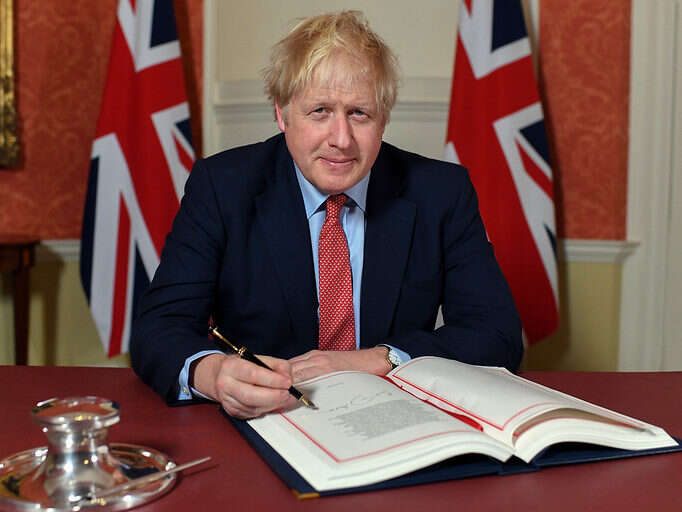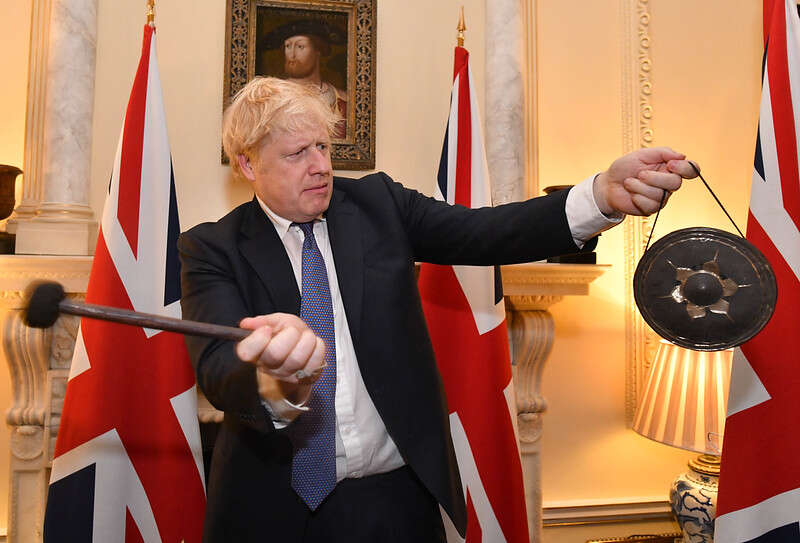
Press photographers are being “excluded from historic moments” in British politics in favour of Boris Johnson’s new official snapper, according to a number of agencies and national picture editors.
The UK Picture Editors’ Guild wrote to Number 10 this week demanding assurances that the “status quo will be preserved” and the press continue to be given access to the Prime Minister.
Press photographers were not invited to capture Johnson signing the historic Withdrawal Agreement from the European Union on 24 January (pictured top) or banging a gong in Downing Street at the moment the UK left the EU at 11pm on Friday last week (pictured below).
Two photographers are usually given the opportunity to attend such historic moments on a rota basis – one from national or regional newspapers via the News Media Association, and one from an agency via the Wire Photo Association – pooling content for others.
Alan Sparrow, chairman of the Picture Editors’ Guild, put the changes down to the appointment of i-Images photo agency co-founder Andrew Parsons as a special adviser to Johnson last month.
Parsons, who is reportedly charged with covering official events for the PM and improving his digital output, has been closely documenting David Cameron, Theresa May and now Johnson since 2005 through his work both as a press photographer and with the Conservative Party.
He was briefly appointed Cameron’s personal photographer in 2010 but was taken off the public payroll following criticism of so-called “vanity staff”.
Sparrow, a former picture editor on the Guardian and Metro newspapers, wrote to Number 10 on Monday after gathering feedback from guild members that “people are not content” with the situation – including staff at Getty Images, PA and the Financial Times.
The guild’s letter said: “We fear that this appointment might have implications for the working relationship we currently have with Number 10 and the Downing Street press office.
“The guild believes that the rota system as operated by WPA and NMA, which has been the status quo for many years, is an effective and a cost-effective way of spreading the Government’s word worldwide and recording the Prime Minister’s activities.
“We fear that the motive behind this appointment is to do with control and an intention to exclude the press from events. I am sure you would agree restrictions to the freedom of press to record events for posterity and for daily consumption by the British public are unhealthy.
“Events such as the signing of the Brexit treaty are of historical significance and should be accessible today and in the future.
“We are not seeking to exclude your special advisor from the events, we just ask that you continue to give access to the WPA and NMA so that we may continue to record the Government’s activities.”
On the two occasions that drew recent concerns, Parsons’ photos were posted online directly to image sharing site Flickr for use with credit, with some organisations such as the PA Wire choosing not to do so.
Sparrow told Press Gazette this posed a dilemma for newspaper picture editors who may have to decide whether to take a stance of unity against using the photos.
Even if they did, their editor “might feel the need to know is greater than the squabbles that go on between the media and Number 10”, he said.

Britain’s Prime Minister Boris Johnson bangs a gong Number 10 Downing Street at 11pm the moment the UK left the EU. Picture: Andrew Parsons/No 10 Downing Street
The Government ignored similar longstanding tradition when it filmed and distributed Johnson’s address to the nation on Brexit Day itself last week rather than inviting an independent broadcaster to cover it, leading some to avoid using the footage in reports.
On Monday political journalists walked out of Downing Street in solidarity after learning only some would be permitted to a specialist briefing.
A spokesperson for the NMA said it is “deeply concerned by recent moves to exclude journalists and photographers from covering high profile events and attending briefings in Number 10 Downing Street”.
“It is vital that the news media is given the fullest possible access to the heart of Government in order for the public to have confidence in the administration.”
Culture Secretary Nicky Morgan yesterday urged Number 10 director of communications Lee Cain to meet Lobby chairman Jason Groves, of the Mail, and Press Gallery chairman Pippa Crerar, of the Mirror, saying: “I don’t think it serves anybody for this, as a debate, to be continuing.”
The NMA agreed, urging Number 10 to “open a dialogue with the industry as soon as possible in order to resolve these issues”.
Number 10 did not respond to requests for comment for this story.
Martin Keene, group picture editor of PA Media, told Press Gazette the long-standing rota arrangements have “worked well for years without criticism or concern” to cover key moments “accurately and impartially”.
“We think that it’s important that we get the opportunity to photograph the Prime Minister carrying out government business, rather than relying upon handouts, which is why we did not run the pictures on the PA Wire,” he said.
“Clearly the government can employ their own photographer, but it should not result in access being diminished for bona fide news photographers.”
Helen Healy, picture editor at the FT, told Press Gazette said she was concerned about a diminished level of access to Johnson as a public servant, and about the possibility that officials can vet Parsons’ images before they are sent out.
“[Johnson] is keeping us at arm’s length essentially, which is problematic,” she said. “There is also an issue of censorship – are these photos being censored in some way?”
Healy said the changes were “moving the press further away from the centre of power” and that she could “see a situation where we are going to be fobbed off all the time”.
“No newspaper wants to exist on using handouts all the time,” she said.
Healy added that it is now “very difficult” to get a photograph where Johnson is “not performing”, but said what the press really wants to see are more “unguarded” or “nuanced” moments.
“That’s what I like as a picture editor,” she said. “We are not going to get that anymore.”
Picture: Andrew Parsons/No 10 Downing Street
Email pged@pressgazette.co.uk to point out mistakes, provide story tips or send in a letter for publication on our "Letters Page" blog

